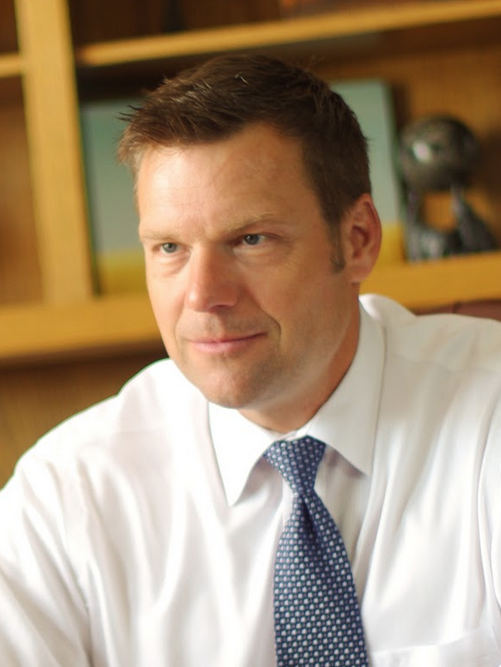
By ROY WENZL
For the Kansas Press Association
Kris Kobach made a national reputation by writing bills for Kansas and other states that opposed illegal immigration and placed restrictions on voting.
Opponents denounced him, judges ruled against some of his legal writings, (one federal judge fined him $27,000 for contempt of court). Critics have said, including in court, that many of his national and state “voter fraud” assertions are false, and that his suggestion for a Muslim national registry to help national security was a cruel and unconstitutional position.
Yet, this was what made him a friend of Donald Trump and a national name. He stands by what he’s done.
But Kansas gubernatorial candidate Kobach talks mostly taxes these days. When asked why Kansans should vote for him on Nov. 6, he pledged lower taxes, including those not directly controlled by the state. At stake, he said, are jobs, livelihoods – and retirement savings. A Republican, Kobach says his opponents, Democratic Sen. Laura Kelly and Independent candidate Greg Orman, are out of touch with voters.
What he’s heard from voters upsets him.
“Everywhere I go, people tell me how they are hurting,” he said. It’s not only state taxes but local property appraisal increases and utility bills, bills he says are 25 percent higher in Kansas than in surrounding states. “Families, elderly people who worked all their lives, and made plans, tell me they are seeing their retirement savings depleted.”
“If you look at income, property and sales taxes combined, we have the highest combined tax rate of the five-state area,” he said. “Our appraisals have been going through the roof in Kansas, our people have seen stealth tax hikes when they’ve had double-digit appraisals (on property taxes). People are being appraised out of their homes.”
The Legislature doesn’t directly set property taxes raised by municipalities and school boards but does have some say, Kobach said. If elected, he’ll ask the Legislature to impose a statutory cap of 2 percent per year on how much property tax appraisals can rise, even though critics content that may not be legally feasible. Kobach also says he will appoint members to the Kansas Corporation Commission to better-regulate utilities.
“Many of our kids are leaving after graduating from high school or college because the businesses are leaving our state,” said Kobach, a father of five. “We’ve driven many businesses out of the state because our taxes are punitively high.”
Here is what else he’d do:
State taxes. “The problem with the tax plan of 2012 was that Kansas cut taxes but did not cut spending. You can’t do it that way. There is a lot that can be cut… I was able to shrink my office, the Secretary of state’s office, from $7 million in fiscal year 2011 to $4.6 million today.”
Schools: Critics said the 2012 tax plan starved schools. Kobach says there’s not a reason to cut money for schools (or roads) if we cut elsewhere, which he says can be done. He will push for a statutory requirement that 75 cents of every school dollar go to teachers and classrooms, rather than administration. Meanwhile: “We have doubled the amount of dollars we spend on education in the last 20 years but … performance and scores have not improved – they’ve flatlined.”
More open government: If elected, he plans to personally make government more open. ”I have a policy of answering reporters’ questions personally, and not through intermediaries,” he said.
The state’s executive branch is open enough, he said. The Legislature, not so much.
“Kansas is one of the few states where the legislature does not record committee votes. And as people who follow politics know, the way you kill a bill — you kill it in committee. Right now, if you want to see how your representative is voting, you have to sit in the committee room and watch his or her lips move. It is outrageous that we don’t have that transparency. And I’ll push for that in office.”
Labor shortages: Kobach said the labor shortage in Kansas is a serious problem – and he’s willing to solve it with legal labor. He pointed out that legal immigrants from Somalia, Myanmar and Mexico have helped economies in southwest Kansas thrive. “I am only concerned with removing the illegal workforce, not the legal workforce. We should be a welcoming state to those who want to come here legally to work, whether it be in a high-tech industry or in the packing plants in southwest Kansas. We absolutely should welcome those who want to come in legally.”
One other solution: Prison labor. Some people in farming and ranching and in meat product services are looking at taking advantage of that now,” he said. “I’m willing to look at maximizing that supply of labor. That may mean moving certain inmates to facilities further west, to where the demand is highest for that.”
His opponents, Laura Kelly and Greg Orman: “Two Democrats,” he said with a grin. (Orman is on the November ballot as an Independent). They are out of step with most Kansans regarding taxes, gun rights, abortion and small government, he said.
The media: The news media is not “the enemy of the people.” “The vast majority of reporters in Kansas are doing a good job.” But – editorial pages over the last 30 years have “gone so far to the left.”
Kobach, 52, grew up in Topeka and earned degrees at Washburn, Harvard, Yale and the University of Oxford. He has served the last eight years as Kansas Secretary of State.
His running mate is Wink Hartman.
– Roy Wenzl is an award-winning journalist who formerly reported for the Wichita Eagle.
